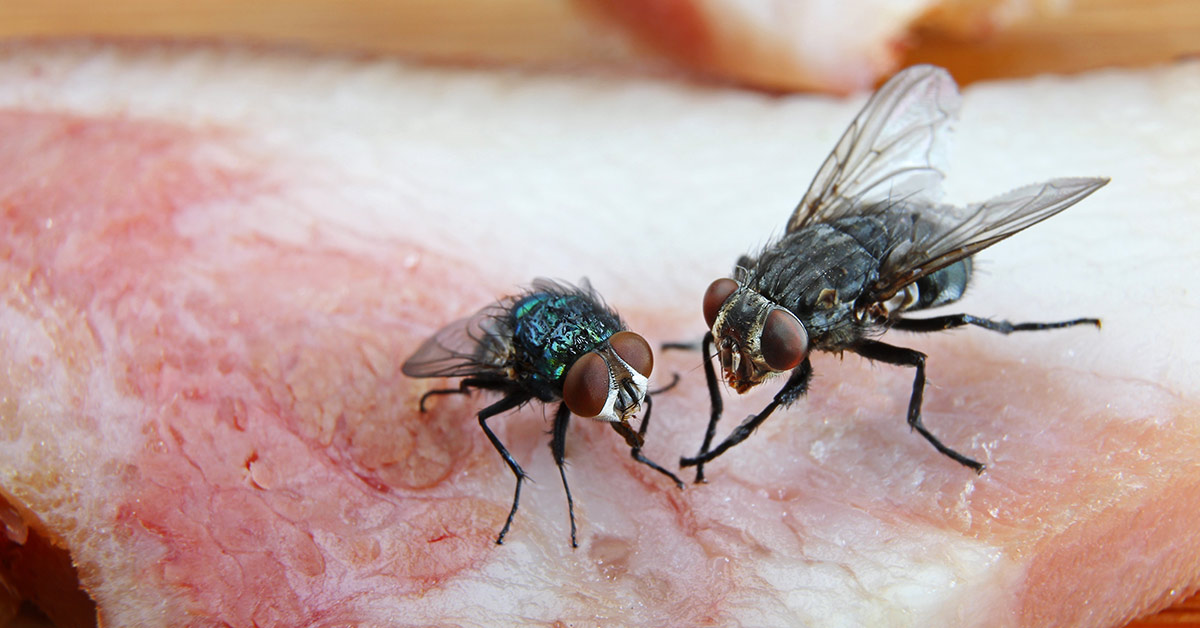The common housefly is one of the more annoying insects we have to deal with. Not only can they be a real party-pooper (more on that later) at an outdoor picnic, but they always find a way to sneak into our homes and bother us indoors, too. Often we find ourselves batting them away from our food. But what actually happens when a fly lands on our food? The answer is, well, difficult to stomach.
What Happens When A Fly Lands On Your Food
We’ve all been there. You’re attempting to enjoy patio season when a fly keeps on buzzing by your food. Everyone leaves unattended food at a barbecue only to come back to find it covered in insects. You’re trying to enjoy a bowl of popcorn while you watch a movie at night and a fly keeps five-bombing your head.
Most of us will just swat the pest away and continue eating. After all, it’s just a tiny fly, right? It wasn’t on the food very long, so how bad could it be? Well, we’re here to inform you that the answer is worse than you think. In fact, it’s really quite gross.
If you have a weak stomach and want to keep living in blissful ignorance, we suggest you stop reading here. Otherwise, these are exactly the reasons why you may want to consider integrating more fly protection at your next picnic and avoid eating food that they come in contact with.
1. Vomit
Flies are very small, so it’s hard to get a look at their faces. If you assumed that this tiny insect eats with a regular mouth, you are unfortunately incorrect. Flies don’t have teeth. Instead, they have a tiny suction-tube-like trunk that they use to slurp food up. The issue is that not all food they like to eat – which is mostly everything – is a liquid. (1)
In order to eat solid foods, they need to turn them into a liquid format. They do this by vomiting up saliva onto it. This saliva turns the solid food into a liquid which they can then suck through their trunk. When you eat food that flies have been on, you’re getting an extra seasoning that you didn’t ask for – Fly vomit.
Read: Please Stop Eating The ‘Clean’ Bit Of Moldy Bread, It’s Not Safe
2. Feces
If a fly only lands on your food for a split second, chances are they haven’t had the opportunity to do much damage. Walk away and come back to flies feasting on your meal, however? You’ll likely want to throw it away. (2)
As flies walk all over vomiting on your food and sucking it up, they’re also then defecating (aka pooping) it out the other end. They’ve got tiny, simple bodies – this doesn’t take very much time. So again, you’re winding up with extra spice that we’re going to guess you have no interest in ingesting.
3. Flies Aren’t Picky
Some species of animals and insects have very specific diets. Flies are not one of those species. They will eat anything and everything – this includes trash, rotting food, roadkill, and even feces. Naturally, when they eat these things they don’t put on tiny fly hazmat suits and they certainly don’t bathe afterward. Nope – they go directly from walking around the trash bin to walking around on your food.
First of all, this means that their bodies are covered in hundreds if not thousands of different types of bacteria. Some of those can be quite dangerous. This also means that they are ingesting those bacteria and vomiting or pooping it out onto your food.
Among the pathogens and parasites, they leave behind while traipsing all over your lunch are a few that can cause some pretty serious illnesses. Scientists believe that flies have transmitted over 65 diseases to humans. Among these include typhoid fever, cholera, and tuberculosis. That’s more than a few uninvited brunch guests.
When To Keep, When To Toss
So, should you toss everything that a fly touches? The short answer is no. If you watch the fly land and you swat it away immediately, then you don’t have much to worry about. Anything longer than that, however, and things begin to get questionable.
Of course, we don’t want to promote food waste. Instead, practice food safety. Use lids to cover things when no one is minding the food. There are also plenty of different types of fly nets and covers you can purchase. Consider, as well, using fly traps and deterrents to keep them far away from your food.
Sources
- “What really happens when a fly lands on your food is worse than you thought.” Business Insider. Cheng Cheng and Jessica Orwig. September 15, 2017.
- “Should I throw away food once a fly has landed on it?.” Sydney. January 4, 2016.

